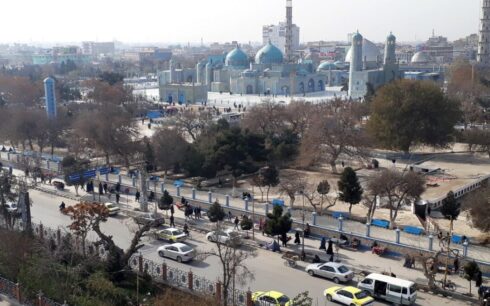KABUL, Afghanistan — Pakistan’s special envoy for Afghanistan has warned Taliban officials that militant groups operating in Afghanistan have gained access to US military equipment left behind after the American withdrawal, two sources familiar with the matter told Amu TV on Thursday.
During a meeting on Wednesday, April 16, in Kabul with Amir Khan Muttaqi, the Taliban’s acting foreign minister, Pakistani envoy Mohammad Sadiq expressed growing concerns about security threats, including militants’ access to advanced weaponry, the sources said.
In response, Muttaqi raised concerns about the activities of the Islamic State’s Khorasan branch (ISIS-K) in Pakistani territory, describing it as a serious threat to Afghanistan’s security, according to the sources.
The Taliban’s deputy spokesman characterized the meeting differently, saying its main focus was planning an upcoming visit by Pakistan’s foreign minister to Kabul, discussing bilateral tensions, and addressing the ongoing deportation of Afghan migrants from Pakistan.
The meeting followed a session of the Afghanistan-Pakistan Joint Coordination Committee, during which Sadiq also met with Qayyum Zakir, the Taliban’s acting deputy defense minister and a close aide to Taliban supreme leader Hibatullah Akhundzada, for discussions focused largely on security issues.
According to sources familiar with the meetings, the Pakistani envoy reiterated Islamabad’s deepening concerns about the presence of Tehrik-i-Taliban Pakistan (TTP) militants operating from Afghan soil. He warned that extremist groups are now armed with sophisticated equipment abandoned during the US military’s withdrawal in 2021.
Despite the Taliban’s public emphasis on diplomatic and migration issues, the discussions behind closed doors appeared to center heavily on mutual security concerns, with both sides trading accusations over cross-border militant activity.
Sadiq’s visit to Kabul on Wednesday came amid heightened regional tensions. In recent days, India, a longtime rival of Pakistan, issued sharp criticisms of Islamabad’s historic support for militant groups. Indian Foreign Minister S. Jaishankar accused Pakistan of fostering a “terrorism industry” and warned that Pakistan’s current instability is a direct consequence of its past support for the Taliban and extremist networks.
The Taliban have not commented publicly on the specifics of Sadiq’s warnings or on the alleged presence of US-origin weaponry in the hands of militants.





